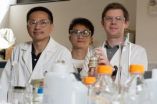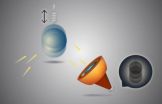(Press-News.org) Facebook has more than 1.23 billion active users worldwide, with over 50 per cent of all users logging on to it on any given day. Most of Facebook's revenue comes from advertising and the company is looking at ways to make the site a more effective advertising platform for marketers. This includes selling ads that are more targeted to their users.
However, researchers have found that users of social media websites are less likely to use them to say positive things about their favourite products and services. Instead, they are more likely to express their opinions about products in intimate face-to-face social situations. This is because most users usually have a wide range of "friends" or "followers" on social media sites, outside of their immediate family and friends, which deters them from expressing their opinions as they feel more vulnerable to adverse comments.
The research was carried out by Imperial College Business School, Cornell University, Leeds University Business School, Marshall School of Business at the University of Southern California and the Department of Management and Marketing at the University of Melbourne.
Dr Andreas Eisingerich, co-author of the report from Imperial College Business School, said: "Social media websites such as Facebook have completely revolutionised the way we share information and communicate with each other. However, our report shows that when it comes to sharing recommendations on products and services on these sites, users tend to stay quiet. They would rather communicate via word of mouth because many users don't want to embarrass themselves online as work colleagues or acquaintances may not endorse or appreciate the same products that they do. Our report could influence how businesses spend advertising budgets on social media websites."
In the study, the researchers surveyed 407 participants in labs and face-to-face surveys to find out how they communicated about their favourite brands. They found that users are reluctant to endorse products on social media sites due to the perceived risk that they could embarrass themselves if their views are not endorsed or shared by others. In contrast, sharing information in face-to-face situations among a smaller group of people, usually family and friends, doesn't have the same social pressures, say the team.
The researchers say their findings are surprising, given the fact that social media platforms have made it easier for users to share information at a time and place that is most convenient for them, such as the comfort of their own homes. This should in theory make people more at ease about sharing their experiences and opinions, say the team.
The researchers also found that those who did share their opinions about their favourite products and services did so because it made them feel good about themselves and that it raised their self-esteem. They found that as the user's need for enhancing their self-esteem increases so does their willingness to share their views; Facebook is an effective way for these types of users to seek feedback and validation.
The researchers suggest that the findings of the report can be used by social media companies and marketers to take steps to ensure that consumers do not feel threatened by these online social risks. This includes providing opportunities for consumers to selectively share their opinions with members of their social network.
INFORMATION:
The report is published in the Journal of Consumer Psychology.
Contact:
Maxine Myers
Media and Communications Officer- Imperial College Business School
Tel: +44 (0)20 7594 6127
Email: maxine.myers@imperial.ac.uk
Out of hours duty press officer: +44(0)7803 886
Notes to editors:
Download a copy of the report:
https://icseclzt.cc.ic.ac.uk/pickup.php?claimID=FxmhnY7MJqhj6AZ6&claimPasscode=jMY8GiUaSNpHeYfy&emailAddr=maxine.myers%40imperial.ac.uk
Claim ID: FxmhnY7MJqhj6AZ6
Claim Passcode: jMY8GiUaSNpHeYfy
2. About Imperial College London
Consistently rated amongst the world's best universities, Imperial College London is a science-based institution with a reputation for excellence in teaching and research that attracts 14,000 students and 6,000 staff of the highest international quality. Innovative research at the College explores the interface between science, medicine, engineering and business, delivering practical solutions that improve quality of life and the environment - underpinned by a dynamic enterprise culture.
Since its foundation in 1907, Imperial's contributions to society have included the discovery of penicillin, the development of holography and the foundations of fibre optics. This commitment to the application of research for the benefit of all continues today, with current focuses including interdisciplinary collaborations to improve global health, tackle climate change, develop sustainable sources of energy and address security challenges.
In 2007, Imperial College London and Imperial College Healthcare NHS Trust formed the UK's first Academic Health Science Centre. This unique partnership aims to improve the quality of life of patients and populations by taking new discoveries and translating them into new therapies as quickly as possible.
3. About Imperial College Business School Established in 2003, Imperial College Business School is one of the world's fastest growing business schools with a reputation for excellence in teaching, research and translation.
The Business School is a constituent faculty of Imperial College London, and fully integrated with the College's cutting-edge work in science, engineering and medicine. It offers MBA, EMBA, MSc and PhD executive education programmes.
In 2013 Imperial College Business School announced that it will found the Brevan Howard School of Finance, a new research centre for financial market behaviour, with a £20.1 million donation from Brevan Howard.
Website: http://www.imperial.ac.uk
Imperial-PR mailing list
Sign up to Imperial Twitter at: http://twitter.com/imperialcollege and http://twitter.com/imperialspark Sign up for Imperial RSS feeds at:
http://www3.imperial.ac.uk/imperialnews/RSS_14150300.xml
More news and events online at: http://www.imperial.ac.uk/news
Social pressure stops Facebook users recommending products on social media sites
2014-06-27
ELSE PRESS RELEASES FROM THIS DATE:
Scientists identify new pathogenic & protective microbes associated with severe diarrhea
2014-06-27
In a finding that may one day help control a major cause of death among children in developing countries, a team of researchers led by faculty from the University of Maryland, College Park and the University of Maryland School of Medicine has identified microorganisms that may trigger diarrheal disease and others that may protect against it. These microbes were not widely linked to the condition previously.
"We were able to identify interactions between microbiota that were not previously observed, and we think that some of those interactions may actually help prevent ...
Eco-friendly versatile nanocapsules developed
2014-06-26
The Institute for Basic Science (IBS) has announced that the Center for Self-assembly and Complexity have succeeded in developing a new technology that introduces metal nanoparticles on the surface of polymer nanocapsules made of cucurbit[6]uril.
The researchers have found that using polymer nanocapsules made of cucurbit[6]uril and metal salts can serve as a versatile platform where equal sized metal nanoparticles can be evenly distributed on the surface of the polymer nanocapsules. Cucurbit[6]uril has properties which strongly and selectively recognize organic and inorganic ...
Do people with autism struggle with driving?
2014-06-26
PHILADELPHIA (June 26, 2014)— In the first pilot study asking adults on the autism spectrum about their experiences with driving, researchers at Drexel University found significant differences in self-reported driving behaviors and perceptions of driving ability in comparison to non-autistic adults. As the population of adults with autism continues growing rapidly, the survey provides a first step toward identifying whether this population has unmet needs for educational supports to empower safe driving – a key element of independent functioning in many people's lives.
"Previous ...
Scientists find potential new use for cancer drug in gene therapy for blood disorders
2014-06-26
LA JOLLA, CA – June 26, 2014 – Scientists working to make gene therapy a reality have solved a major hurdle: how to bypass a blood stem cell's natural defenses and efficiently insert disease-fighting genes into the cell's genome.
In a new study led by Associate Professor Bruce Torbett at The Scripps Research Institute (TSRI), a team of researchers report that the drug rapamycin, which is commonly used to slow cancer growth and prevent organ rejection, enables delivery of a therapeutic dose of genes to blood stem cells while preserving stem cell function.
These findings, ...
Awareness month spurs web searches for autism
2014-06-26
PHILADELPHIA (June 26, 2014)—Autism Awareness Month each April brings blue lights and puzzle shapes out to shine in many communities – but does it actually lead to increased autism awareness? According to a new analysis of web search trends by researchers at Drexel University, it does appear to drive an increase in Google searches for autism – by a third over searches in March in recent years.
Brian K. Lee, PhD, an assistant professor in the Drexel University School of Public Health and research fellow of the A.J. Drexel Autism Institute, was senior author of the study ...
New infections cause dormant viruses to reactivate
2014-06-26
GAINESVILLE, Fla. — The famous slogan is "A diamond is forever," but that phrase might be better suited to herpes: Unlike most viruses, which succumb to the immune system's attack, herpes remains in the body forever, lying in wait, sometimes reactivating years later.
Researchers have long wondered what causes herpes viruses — two strains of which are linked to cancer — to reactivate after remaining dormant once the initial infection resolves. Now a team of researchers, including two University of Florida scientists, has discovered that interactions with other infections ...
Fighting parasitic infection inadvertently unleashes dormant virus
2014-06-26
Signals from the immune system that help repel a common parasite inadvertently can cause a dormant viral infection to become active again, a new study shows.
Further research is necessary to understand the clinical significance of the finding, but researchers at Washington University School of Medicine in St. Louis said the study helps illustrate how complex interactions between infectious agents and the immune system have the potential to affect illness.
The results appear online June 26 in Science Express.
The scientists identified specific signals in mice that ...
Sequencing electric eel genome unlocks shocking secrets
2014-06-26
EAST LANSING, Mich. — For the first time, the genome of the electric eel has been sequenced. This discovery has revealed the secret of how fishes with electric organs have evolved six times in the history of life to produce electricity outside of their bodies.
The research, published in the current issue of Science, sheds light on the genetic blueprint used to evolve these complex, novel organs. It was co-led by Michigan State University, University of Wisconsin-Madison, University of Texas-Austin and the Systemix Institute.
"It's truly exciting to find that complex ...
Water-cleanup catalysts tackle biomass upgrading
2014-06-26
Rice University chemical engineer Michael Wong has spent a decade amassing evidence that palladium-gold nanoparticles are excellent catalysts for cleaning polluted water, but even he was surprised at how well the particles converted biodiesel waste into valuable chemicals.
Through dozens of studies, Wong's team focused on using the tiny metallic specks to break down carcinogenic and toxic compounds. But his latest study, which is available online and due for publication in an upcoming issue of the Royal Society of Chemistry's journal Chemical Science, examined whether ...
Not much force: Berkeley researchers detect smallest force ever measured
2014-06-26
What is believed to be the smallest force ever measured has been detected by researchers with the Lawrence Berkeley National Laboratory (Berkeley Lab) and the University of California (UC) Berkeley. Using a combination of lasers and a unique optical trapping system that provides a cloud of ultracold atoms, the researchers detected a force of approximately 42 yoctonewtons. A yoctonewton is one septillionth of a newton and there are approximately 3 x 1023 yoctonewtons in one ounce of force.
"We applied an external force to the center-of-mass motion of an ultracold atom ...






